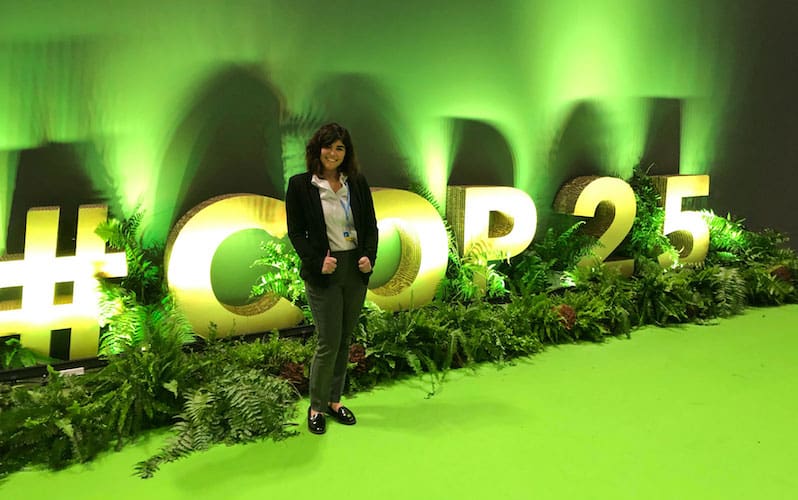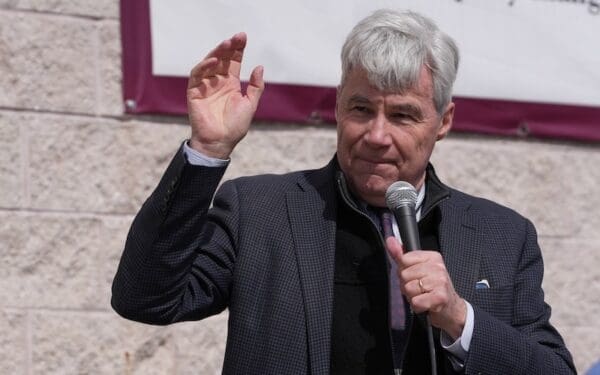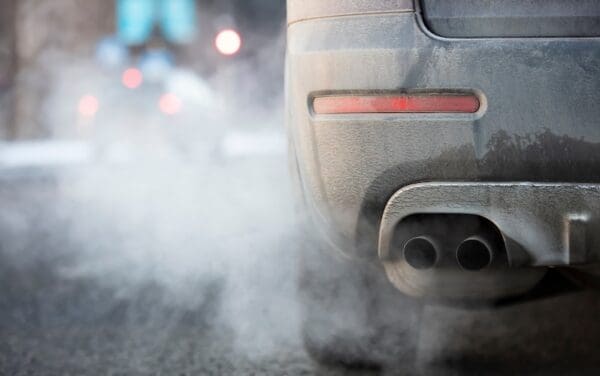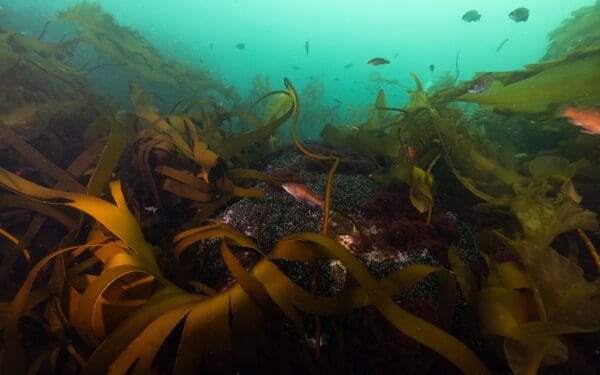
Northeastern student Ava Gallo was selected to be part of Northeastern’s student delegation at COP25 for the first week of the negotiations. Photo Credit: Ava Gallo
Attending the annual United Nations’ COP – Conference of the Parties – on climate change in Madrid was exciting, frustrating, disappointing, and heartening all at once.
I study Environmental Studies and International Affairs at Northeastern University, so I was thrilled to be selected to attend the first week of COP25 as part of the university’s delegation. Like so many people my age around the world, I’m deeply concerned by the future that scientists predict is in store if we don’t do something about climate change now. Attending COP gave me a front-row seat to see how our world’s leaders are moving forward the agreements made in Paris in 2016.
I’d like to say I returned from Spain feeling reassured. But, frankly, what I saw was far too much formality and process and not nearly enough action. I’m not naïve – I know that international negotiations are an art and require a lot of finesse to reach agreements everyone can live with. However, climate change is one of the most critical and urgent issues our world has ever had to face, and we will not fix it without every single country making drastic changes to their economies and lifestyles.
If World Powers Don’t Cooperate, We Won’t Solve the Climate Crisis
One of the “hot button” negotiation topics at COP25 is Article 6, the only piece of the Paris Agreement not resolved at COP24. The Article 6 rulebook will essentially decide how carbon markets and other forms of international cooperation on emissions reductions will be implemented. This article from Carbon Brief gives a very detailed outline of the controversial pieces of the article and why it was left undecided last year.
The goal of Article 6 is to establish a cooperative approach to reduce emissions around the globe—including creating an international carbon market. If done right, it would enhance countries’ abilities to cut their carbon pollution. But if the language isn’t clear, Article 6 could end up allowing countries to emit more carbon by engaging in questionable accounting practices.
The best example of this is Brazil’s strategy of “double counting,” which lets two countries count the same emissions reduction as part of their targets. For instance, if Brazil sells clean energy to another country, both Brazil and the country that bought the energy could count it towards their goals. Because of this, getting Article 6 right could make or break the Paris Agreement. Ultimately, COP25 ended without an agreement on this key issue.
As a newcomer to COP, I was drawn to these negotiations from the beginning. The decisions made on Article 6 will determine if the Paris Agreement can truly lower global emissions. With climate change already impacting people around the world, we cannot afford to fail.
We Need Systemic Change to Avoid Climate Catastrophe
In between listening to Article 6 negotiations, I attended a side event titled, “The Right to Climate Justice: Collective Convergence for Just Solutions and Against Geoengineering.” I was busy typing notes when I heard a panelist from the Health of Mother Earth Foundation remark, “COP is a joke.” My hands froze on my keyboard.
He elaborated by saying that he finds it pathetic that carbon markets are the biggest issue being discussed at COP25. Such markets only address the symptoms of climate change and not its root cause. The situation is dire, he continued, and we need to create systems that reject fossil fuels in their entirety, not systems that barely regulate them.
I was floored. It’s not that I haven’t been critical of the environmental movement myself, but I was so focused on the “hot button” issue of COP25 and trying to understand the negotiations process that I never thought to question what was being discussed. However, I could not agree more with the panelist’s comments. Climate change is the biggest challenge we’ve ever faced, but there was no sense of urgency reflected in the topics discussed during negotiations.
Scientists have warned that we only have a few years to dramatically reduce carbon emissions before we cause catastrophic changes to our planet. This requires an economic and societal shift we’ve never seen before. We’ll need to keep fossil fuels like gas and coal in the ground, make our homes and businesses more energy efficient, get gas guzzlers off the road, and so much more. We cannot continue business as usual.
Frustrations Build as World Leaders Focus on the Wrong Things
As the week progressed, and I continued to attend the Article 6 negotiations, I began to get very frustrated. For example, one day, delegates from each country spent 40 minutes discussing whether they would call the next day’s meetings bilaterals, multilaterals, or informal informals. They landed on “get-togethers.”
These were negotiations on the most important topic to be decided at COP25, and our leaders were focused on what to call their meetings rather than on the solutions that must come from them.
The gap in ambition between the negotiation rooms and the side events was stark. It also highlighted how important it is to take action at the local level—for instance, passing state-level climate laws and advocating for clean energy in New England. We may not be able to rely on world leaders to create the change we need quickly enough to avoid the most devastating effects of climate change.
We Have No More Time to Waste
It is incredible that countries around the world can come together and agree on anything. Particularly when nothing can force them to compromise. However, solving climate change demands real change from all nations. And with world leaders talking in circles, it’s clear that local action is needed now more than ever.
Now that I’m back home, and as I finish up my internship at CLF, I’m eager to become even more involved in climate advocacy – and to encourage others to get involved as well. As Greta Thunberg stated at COP24, “Since our leaders are behaving like children, we will have to take the responsibility they should have taken long ago.”
Personally, I look forward to joining Northeastern’s robust environmental and social justice community and demanding climate action from our leaders. In the absence of leadership on the national and international stage, we must all create our own change by pushing for progress on a more local level.
The more time we waste, the more the burden of climate change affects the most vulnerable on this planet who are the least responsible for the problem. For example, right here in New England, communities of color and with low incomes are more likely to face climate impacts than those shielded by wealth.
I have to believe that when the stakes are this high, we will move beyond business as usual for the best of humanity.



